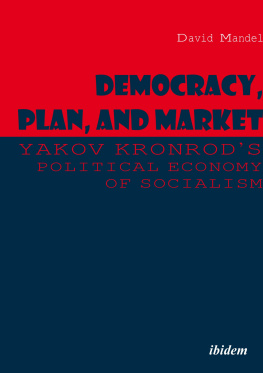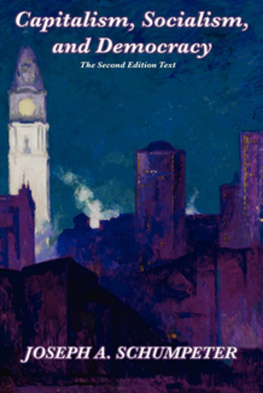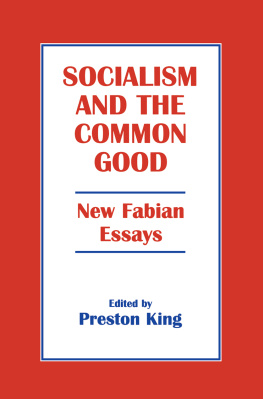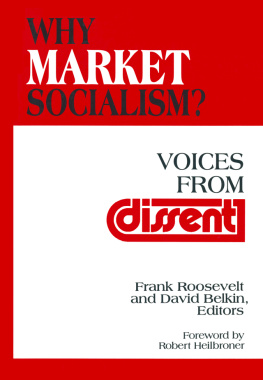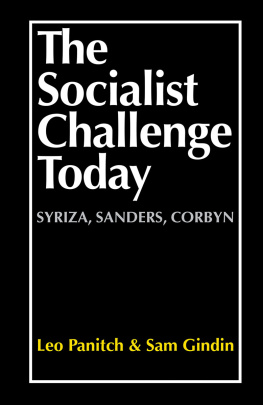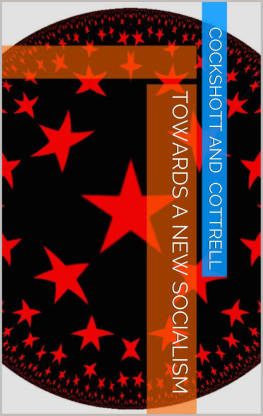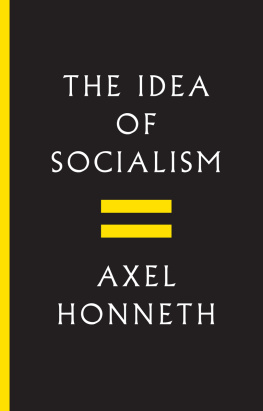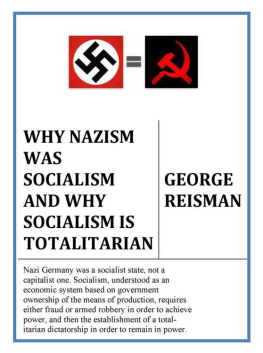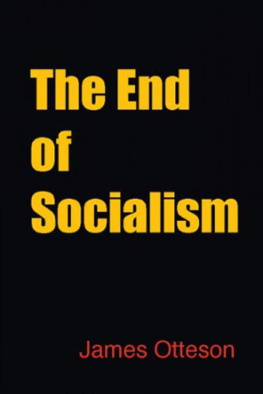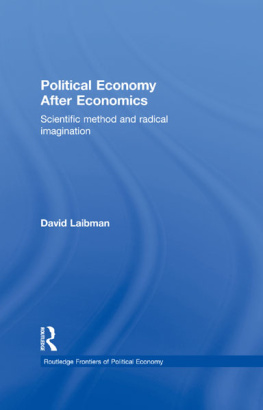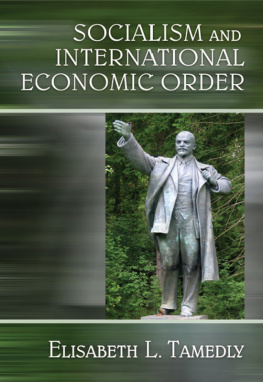INTRODUCTION
This book presents an overview of the thought of Yakov Abramovich Kronrod (19121984), a leading Soviet theorist of the political economy of socialism, but little known today. A bold and original thinker, he argued, in opposition to the founders of Marxism and to the prevailing Soviet orthodoxy, that commodity-money relations and the law of value are integral parts of socialism and that socialism itself should be considered, if not a separate mode of production, then at least a lengthy, relatively autonomous period of transition between capitalism and communism (when scarcity would finally have been overcome, real social equality achieved, and work would have become its own main reward), a stage governed by own laws of motion. He thus rejected the traditional Marxist view that market relations are a source of economic anarchy and alienation, the antithesis of planning and solidarity. He argued, on the contrary, that commodity-money relations, though subordinate in socialism, are essential to effective national planning, to collective, societal control over the economy. But at the same time, he rejected the concept of market socialism, insisting on effective national (obshchenarodnyi) ownership and the primacy of planning and direct (that is, non-commodity) relations under socialism.
Kronrods youth coincided with the period of construction of the new society that had emerged from the October Revolution. In a letter from the Stalingrad front in 1942, he wrote: Everythingmy mind, my blood, heart and every nerve were born in the October flame. He lived through all the major turns of his countrys turbulent history: reconstruction under the New Economic Policy after the civil war, the enthusiasm generated by the first five-year plans, the upheaval of forced collectivization, the Stalinist terror, the Great Patriotic War (the victory in which he attributed to what remained in popular consciousness of the promise of October), Khrushchevs thaw; and, finally, the conservative bureaucratic reaction and the period of stagnation (zastoi) under Brezhnev that accelerated the systems decomposition. It was apparently at the start of this latter period that Kronrod reached the conclusion that the Soviet system was a historical dead-end, that it was incapable of being reformed, and that only a revolution could restore the country to a path of historical progress. That was not an easy conclusion to reach for someone who had spent the war years at the front defending the socialist homeland against fascism under the leadership of the Stalinist regime.
Kronrod earned university degrees in the 1930s in philosophy and economics, after which he took up positions at Gosplan, the state planning agency, and at the Central Statistics Agency, before finally moving to the Institute of Economics of the USSR Academy of Science, the countrys premier economic research centre. When war broke out, he immediately volunteered for the front. Beginning as a machine-gunner private in the battle for Moscow, he ended the war as a major in East Prussia. After the war, he returned to the Institute of Economics and eventually headed its theoretical sector, a position that he held until he was forcefully removed by the regime at the start of the 1970s.
It was during the period of thaw, inaugurated in 1956 by Khrushchevs denunciation of Stalin at the twentieth party congress, that Kronrod produced his really original work. He was a member of the 1960s generation, the shestidesyatniki. It was a time of heightened intellectual and artistic ferment and of hope in a socialist renewal. Kronrod took active part in the discussions around the planned economic reform, the so-called Kosygin reform, whose introduction began in 1966, but fell far short of what Kronrod considered necessary.
Khrushchevs dismissal as Secretary General of the Communist Party in 1964 opened the way for a bureaucratic reaction. While there were good reasons for dissatisfaction with Khrushchevs leadership, the nomenklatura (the Central Committee meeting that dismissed Khrushchev was a gathering of the lite of that bureaucratic caste) was motivated primarily by concern for its own power and privilege, concern that was soon after greatly intensified by the Prague Spring in 1968, a genuinely national movement for socialist democracy that included the Czechoslovak Communist Party itself. The military suppression of this movement by the Soviet Union marked the final end of what still remained of the thaw in the USSR.
The Soviet leadership could not, of course, admit openly that it had sent in the tanks because it felt threatened by the example of socialist democracy in an allied state. Instead, the economic reform that was being implemented in Czechoslovakia, dubbed market socialism by Soviet ideologues, was presented as opening the way to the restoration of capitalism. In this context, Kronrods views on the role of market relations in socialism, which had been more or less tolerated until then, were considered dangerous. The Central Committee apparatus ordered the party organization of the Institute of Economics to take the lead in criticizing Kronrods ideas. But the institutes party committee refused. And so the task was taken up directly by the Soviet Central Committee, with the high-level participation of Politburo members, Central Committee secretaries, other major party figures, as well as a number of directors of Academy of Science institutes.
In December 1971, in the presence of a Politburo member and against the objections of the local party secretary, A.V. Nikiforov, a meeting of the institutes party organization adopted a resolution criticizing Kronrods sector for ideological errors of theoretical significance. The following heretical positions were attributed to him:
socialism in the USSR is a particular order of socioeconomic inequality
exploitation continues to exist in the USSR
there is no basis for the moral-political unity of the people
there is no basis for the friendship of its various peoples
a material basis for mature, developed socialism will not exist for a long time
socialism is a separate mode of production from communism, not merely its early phase.
Kronrods already much diminished theoretical sector was then completely disbanded, and he was reduced to the rank of acting senior researcher. Any new work of his of theoretical significance was placed under a publication ban, that lasted until Gorbachevs perestroika, which Kronrod did not live to see. Criticism of Kronrods school of political economy became mandatory for anyone wishing to publish in related areas of political economy. As economist D. Moskvin recalled: Kronrod provided so many people with work! There were different schools of political economyTsagolovs, Kuzminkovs, the optimizers
Although these repressive measures were a part of the general tightening of ideological control in the wake of the Prague Spring, the fact that they coincided with the virtual abandonment of the Kosygin reform, which, however half-heartedly, had embraced some of the ideas that Kronrod had been advocating, notably broadened enterprise autonomy and so a greater role for market relations, indicates that the ideas of Kronrods school were considered by the nomenklatura as rather more than a mere theoretical deviation from orthodoxy. It saw in those ideas a political threat to its monopoly on power, which was the unconditional foundation of the bureaucratic system, a system that could not tolerate the existence of any political or economic subjects other than the bureaucracy itself. It was that logic that had guided Stalin, the recognized leader of the bureaucratic faction of the party, in imposing the command economy in 1929 and virtually suppressing commodity-market relations. That move gave the bureaucracy direct administrative control over the entire economic life of the country, even though, as Kronrod argued (see ch. 5 here), it undermined its ability effectively to plan the economy.

